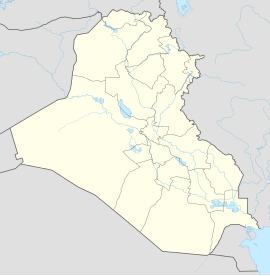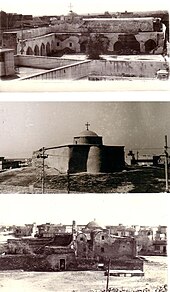Baghdida
| Baghdida | ||
|---|---|---|
| location | ||
|
|
||
| Coordinates | 36 ° 16 ' N , 43 ° 23' E | |
| Country |
|
|
| Governorate | Ninawa | |
| District | al-Hamdaniya | |
| Basic data | ||
| Residents | 50,000 (2012) | |
| City view of Baghdida, in the middle left the Syrian Catholic Church al-Tahira (كنيسة الطاهرة الكبرى, Church of the Immaculate Conception ) March 2009 | ||

Baghdida ( Arabic بغديدا, DMG Baġdīdā , Aramaic ܒܓܕܝܕܐ Baghdeda ) or Bachdida (بخديدا, DMG Baḫdīdā ), also known under the name Karakosch ( Kurdish قەرەقۆش Qaraqosh ), is an Assyrian city in Iraq and the center of the al-Hamdaniya district ( Arabic الحمدانية, DMG al-Ḥamdānīya ).
It is located about 32 km southeast of Mosul in the Nineveh plain in the province of Ninawa . The city is close to the ancient Assyrian cities of Nimrud and Nineveh .
population
98% of the city's residents are Christians and belong to the Syrian Catholic Church and the Syrian Orthodox Church . The Christian residents call the city Baghdeda . To the north of the village is the monastery of St. John of Dailam .
Almost 90% of the Christians in Baghdida are Syrian Catholics. According to data released by Church in Need in 2020 , over 90% of Christians surveyed in Baghdida identify themselves as " Syriac " ( " Syriac "), and 92% said Surith (" Syriac ", Eastern Aramaic ) was their first language.
history
In early August 2014, fighters from the Daesch (Islamic State, IS) terrorist group captured the city and forced many of the Christian residents to flee. The Mar Behnam monastery in the village was destroyed by IS. On October 18, 2016, as a result of the battle for Mosul, the IS fighters fled the city without a fight from the advancing Iraqi armed forces .
Before the conquest of Baghdida by Daesh, around 50,000 Christians made up about 97% of the population. Around 9,000 families - almost the entire population - fled from the Islamists, mostly to Ankawa near Erbil . Around 15,000 people were accommodated here in the Mart Shmoni refugee camp and around 4,000 in the Ankawa shopping center. After the Islamists were driven out, around 5,000 Christian families had returned to Baghdida by April 2018. According to a 2020 study by Church in Need , the population in Baghdida began to decline again in 2019 as residents increasingly migrate abroad. The most important reason given is the political insecurity and general threat, since most Christians in the Nineveh Plain feel insecure in view of the Shiite militias operating here - in particular the al-Hashd al- Shabī ( Shabak militia or 30th Brigade). Here Baghdida is one of the few places in the Nineveh plains, where the Christian units to protect the Nineveh plains ( Nineveh Protection Units , NPU) are in control. Baghdida also issued a ban on selling land to people who did not live here before 2014. To reverse the trend of emigration, the Church in Need supports reconstruction projects. This includes, among other things, the reconstruction of the Great al-Tahira Church in Baghdida by 2020. According to the reconstruction committee for the Nineveh Plain, which was founded with the support of the Church in Need, around half of the previously 11,000 Christian families will be in Baghdida by August 2020 returned.
Place name
The origin of the name Baghdida , also Baghdede ( Syriac ܒܝܬ ܟܘܕܝܕܐ Beth Chdeda ) is not clear. In Syriac meansܒܝܬ Beth "house" whileܟܘܕܝܕܐ Chodida can be translated as “youth” in Aramaic , but is also brought together with Baghdadak , a diminutive of Baghdad , which is translated as “God's gift” in Old Persian . Others, in turn, interpret the name as Aramaic Beth Deta , "land of the kite".
In German, but also in French and English media, the unofficial Turkish name Karakoş is mostly used, which comes from the time of the Ottoman Empire and is also written Qaraqoş based on Ottoman phonetics . This name means "black bird" ( kara koş ) and is mostly rendered in German with Karakosch , in English on the other hand with Qaraqosh . Representatives of the Syrian Catholic Church, such as Pastor Georges Jahola from the Great al-Tahira Church in Baghdida, prefer the Western media not to use the Turkish name Qaraqoş , but the Aramaic ( Syrian and also used in Arabic) name Baghdida .
Sons and daughters
- Jules Mikhael Al-Jamil (1938–2012), Syrian Catholic Curia Archbishop
- Basile Georges Casmoussa (* 1938), retired Syrian Catholic Curia Archbishop
- Boutros Moshe (* 1943), Syrian Catholic Archbishop of Mosul
- Yousif Abba (* 1951), Syrian Catholic Archbishop of Baghdad
- Yousif Benham Habash (* 1951), Syrian Catholic Archbishop of Newark
- Nizar Semaan (* 1965), Syrian Catholic Bishop of Adiabene
Web links
Individual evidence
- ↑ ishtartv.com
- ↑ a b Pascal Meguesyan: St Mary Al-Tahira church in Baghdede (Qaraqosh). Mesopotamia Heritage, April 2017.
- ↑ Andrzej Halemba , Xavier Bisits: Life after ISIS: New challenges to Christianity in Iraq. Results from ACN's survey of Christians in the liberated Nineveh Plains. . Aid to the Church in Need , June 2020. pp. 11f.
- ↑ Iraq - mass exodus from terror of the Islamic State. In: Frankfurter Allgemeine Zeitung. August 7, 2014 ( FAZ.net ).
- ^ A crib wanted in FAZ of December 24, 2014, page 10
- ↑ Iraqi army recaptured Qaraqosh from IS. In: Zeit Online, October 19, 2016 ( zeit.de ).
- ↑ Zara Sarvarian: Iraq's Assyrian Christians: resurgence persecution and. World Watch Monitor, April 4, 2018.
- ↑ Andrzej Halemba , Xavier Bisits: Life after ISIS: New challenges to Christianity in Iraq. Results from ACN's survey of Christians in the liberated Nineveh Plains. . Aid to the Church in Need , June 2020, pp. 39, 46.
- ↑ Iraq: Church building for hope. Six years after the IS conquests, the reconstruction in the Nineveh Plains continues. Church in Need , August 5, 2020.
- ↑ اصول أسماء القرى والمواقع التابعة لمنطقة بخديدا , بهنام عطاالله Bakhdida.con, accessed on August 30, 2020.
- ^ Courtney Mares: Cathedral in Iraq's largest Christian town to be rebuilt in 2020. Catholic News Agency , December 19, 2019.


